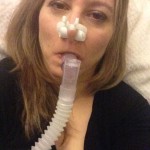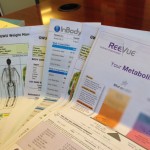 I mentioned that last week I visited the GWU Weight Management and Human Performance Lab to check out the lab and get some tests done so I can really figure out what the key is that will help get me where I want to be.
I mentioned that last week I visited the GWU Weight Management and Human Performance Lab to check out the lab and get some tests done so I can really figure out what the key is that will help get me where I want to be.
Todd Miller who runs the lab and is an Associate Professor in the Department of Exercise Science and was kind enough to offer me some testing so I can share my experiences with anyone interested in experiencing the lab.
Todd ran me through a series of tests and then we sat down, reviewed the results and discussed ways to get me where I want to be.
 First, he measured my height and weighed me and then had me stand on a the Body Composition – BIA machine that measured my weight, body fat etc using electromagnetic pressure contact, not unlike the scales and other machines readily available. Then we used the Dexa machine…
First, he measured my height and weighed me and then had me stand on a the Body Composition – BIA machine that measured my weight, body fat etc using electromagnetic pressure contact, not unlike the scales and other machines readily available. Then we used the Dexa machine…
Body Composition – Dexa (or DXA) -The gold standard for body composition assessment. The DXA scan uses a low-dose x-ray (approximately 1/10th the radiation of a traditional chest x-ray) and provides information about bone mineral density, fat, and fat-free mass in to specific regions of the body with an accuracy of ±2%.
 After that test was complete, which took maybe five or so minutes, it was time to test my Resting Metabolic Rate – The resting metabolic rate (RMR) is the amount of energy (calories) a body burns while at rest, which accounts for approximately 70% of the body’s daily energy expenditure. This is the amount of energy needed to perform vital body functions such as respiration and circulation.
After that test was complete, which took maybe five or so minutes, it was time to test my Resting Metabolic Rate – The resting metabolic rate (RMR) is the amount of energy (calories) a body burns while at rest, which accounts for approximately 70% of the body’s daily energy expenditure. This is the amount of energy needed to perform vital body functions such as respiration and circulation.
 After the testing was done, Todd and I talked through the results. I gained some weight in the last year and half. It was as much as I had thought – so while that’s not great news per se, it wasn’t shocking and it confirmed my own sense of where I am. The good news… all the fitness I do – does make a difference whether I am at an optimal weight or body fat %. I am fit — and the weight i gained, once I lose it – I should be in the ‘good’ categories all around.
After the testing was done, Todd and I talked through the results. I gained some weight in the last year and half. It was as much as I had thought – so while that’s not great news per se, it wasn’t shocking and it confirmed my own sense of where I am. The good news… all the fitness I do – does make a difference whether I am at an optimal weight or body fat %. I am fit — and the weight i gained, once I lose it – I should be in the ‘good’ categories all around.
- Bone density is good.
- My RMR is high. That means I burn a lot of calories just being.
- I have a good amount of lean muscle mass.
I’m not going to discuss my actual numbers here – they are irrelevant to anyone but me. What I will share is that we talked about how much protein I need based on my lean muscle mass and what would be my optimal amount of calories to get me back to where I will feel most comfortable. The thing is my goal isn’t about being super lean. I want to feel comfortable in my own skin without being crazy about every little thing I eat or drink. I did that years ago – and it consumed my life. My goal is to be healthy and fit – not an Olympian or champion competitor. I am living this way so I am able to move, have fun, try new things and age without the fear of being immobile. That is what I discussed with Todd – he made some suggestions on what would be a reasonable caloric and protein intake per day to get me there. As for exercise, I clearly don’t need help in that area. I am fit!
The one thing that caught me off guard is how much protein Todd suggested I eat per day: 146g He based it on how much lean body mass I have. I am not sure how one goes about eating that much protein in a day but i have been trying without upping my overall suggested caloric intake. It’s been quite a challenge – the closest I have gotten is 96g.
I have also begun to track my fitness and food intake using fatsecret.com. Todd sent me an invite and he can monitor what I am eating from time to time to give me advice. Check it out –so far I am liking it.
One of things that has always confused me is why is it so hard? Todd explained that most of it is simple math – which is not hard but it is hard to put into place. Knowing that there is science and data behind what we discussed helped me leave the lab with a sense of an actual plan to get me back to where I will feel comfortable. Before that, i have just guessed at where I am and how much I need to eat. With Dr Miller’s suggestions, I feel confident about being able to do it.
Protein Intake – How Much Protein Should You Eat Per Day?
I will keep you posted on my overall progress – the good and bad of it as we head into Spring and Summer.
One response to “GWU Weight Management and Human Performance Lab”
[…] am about a week into following Dr Miller’s advice about adding more protein into my diet and here are some thoughts and findings so […]